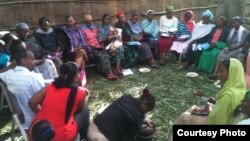Ethiopian women produce an average of five children in their lifetimes because less than 30 percent of women in Ethiopia - the second-largest population in Africa - have access to birth control devices.
A project offering increased health services in portions of the largely rural countryside of this country proposes to lower the birth rate by increasing access to birth control with an electronic voucher scheme targeting young Ethiopian women between the ages of 15 and 29 years of age.
The scheme is based on teams of health volunteers who offer rural women the chance to learn the benefits of birth control and have an opportunity to order intra-uterine devices (IUDs) and other birth control measures. The voucher system, which is run by the non-profit Marie Stopes International and funded by the government of the Netherlands, is meant to increase use of health services while addressing the unmet need for contraceptives.
“It is a pro-poor approach,” said Abebe Shibru, deputy country director of Marie Stopes International, Ethiopia. “So women who want to get the service can get it free of charge. So it would enable us to reach the underserved community in Ethiopia.”
The e-voucher program, which began in Assela, Debre Markos, Shashemene, Nekemte and Dessie, started as a program passing out paper vouchers. It was expanded to 20 other communities and replaced with a system that allows women to received electronic vouchers as texts on the telephones of the local health volunteers.
Teaching birth control through the coffee tradition
“The voucher distributors go from home to home, organizing community forums such as traditional coffee ceremonies,” said Shibru. “So the coffee ceremonies will serve as an opportunity to discuss about family planning. If the discussant wants to get any service and can’t afford it, she will be eligible for a voucher program.”
Three community workers stationed in these facilities offer clients IUD’s or any other contraceptive of choice, plus counseling and basic health care information. Abebe said the volunteers are given training, equipped with mobile phones and then sent out to raise awareness about family planning in communities.
Vouchers in the form of text messages are sent to client’s phones. Another coded message is sent by phone to facilities called MSI Ethiopia Centers where the e-vouchers can be redeemed for free or subsidized family planning services. Currently, 86 percent of clients who visit clinics run by Marie Stopes International own mobile phones, Shibru said.
About half of the 2,521 e-vouchers distributed since the program begun have been redeemed. Patrons can also access treatment from a group of health facilities of Marie Stopes International or be referred to government hospitals for free services.
“The e-vouchers have helped us to reach as many clients as possible. For example, I can mention one of the centers where we initiated the e-vouchers. After the vouchers, the number of clients coming to the center increased by 20 to 25 persons,” Abebe said.
A project offering increased health services in portions of the largely rural countryside of this country proposes to lower the birth rate by increasing access to birth control with an electronic voucher scheme targeting young Ethiopian women between the ages of 15 and 29 years of age.
The scheme is based on teams of health volunteers who offer rural women the chance to learn the benefits of birth control and have an opportunity to order intra-uterine devices (IUDs) and other birth control measures. The voucher system, which is run by the non-profit Marie Stopes International and funded by the government of the Netherlands, is meant to increase use of health services while addressing the unmet need for contraceptives.
“It is a pro-poor approach,” said Abebe Shibru, deputy country director of Marie Stopes International, Ethiopia. “So women who want to get the service can get it free of charge. So it would enable us to reach the underserved community in Ethiopia.”
The e-voucher program, which began in Assela, Debre Markos, Shashemene, Nekemte and Dessie, started as a program passing out paper vouchers. It was expanded to 20 other communities and replaced with a system that allows women to received electronic vouchers as texts on the telephones of the local health volunteers.
Teaching birth control through the coffee tradition
“The voucher distributors go from home to home, organizing community forums such as traditional coffee ceremonies,” said Shibru. “So the coffee ceremonies will serve as an opportunity to discuss about family planning. If the discussant wants to get any service and can’t afford it, she will be eligible for a voucher program.”
Three community workers stationed in these facilities offer clients IUD’s or any other contraceptive of choice, plus counseling and basic health care information. Abebe said the volunteers are given training, equipped with mobile phones and then sent out to raise awareness about family planning in communities.
Vouchers in the form of text messages are sent to client’s phones. Another coded message is sent by phone to facilities called MSI Ethiopia Centers where the e-vouchers can be redeemed for free or subsidized family planning services. Currently, 86 percent of clients who visit clinics run by Marie Stopes International own mobile phones, Shibru said.
About half of the 2,521 e-vouchers distributed since the program begun have been redeemed. Patrons can also access treatment from a group of health facilities of Marie Stopes International or be referred to government hospitals for free services.
“The e-vouchers have helped us to reach as many clients as possible. For example, I can mention one of the centers where we initiated the e-vouchers. After the vouchers, the number of clients coming to the center increased by 20 to 25 persons,” Abebe said.





